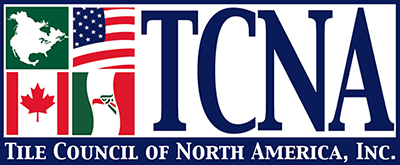
Standards and the Ceramic Tile Industry
To the ceramic tile industry, standards are everything. They are the basis for categorization and definition. They set expectations for physical performance, visual aesthetics, and the overall quality of products and installations. They address important health, safety, and sustainability aspects of products and applications, and they serve a critical role in protecting consumers. The Tile Council of North America (TCNA) relies on ASTM International to facilitate the development of standards for the betterment of the ceramic tile industry, and within its state-of-the-art testing and research facility – International Product Assurance (IPA) Laboratories – ASTM standards are used not just for ceramic tile but for many other types of products.
TCNA is a leader in the development of numerous quality standards protecting consumers and serves as the secretariat to Accredited Standards Committee A108 of the American National Standards Institute (ANSI) on ceramic tile, the body that develops ANSI A137.1. This standard is the industry’s foundational document promoting uniformity, quality assurance, and reliability in the production and application of ceramic tiles across different projects and settings. It covers essential factors such as water absorption, breaking strength, coefficient of friction, surface flatness, and dimensional tolerances, and it almost exclusively references ASTM test methods.
One of the tile industry’s most important tests is the test methods for determination of water absorption (C373), which serves as the basis for how tile products are classified in ANSI A137.1. It is especially critical that water absorption be accurately determined per C373, as it is the determining factor for whether a ceramic tile is considered porcelain or not. Only tiles with water absorption of 0.5% or less, when tested per C373, can be deemed porcelain by the Porcelain Tile Certification Agency (PTCA). Furthermore, C373 is used by the U.S. International Trade Commission (USITC) to categorize ceramic tiles per the Harmonized Tariff Schedule (HTS) and track the international movement of products.
Also specified by ANSI A137.1 are: C485 for warpage, C499 for facial dimensions, and C502 for wedging, which are three critical test methods for the dimensional analysis of ceramic tile. Relevant to the physical performance of ceramic tile, some important ASTM test methods specified by ANSI A137.1 include the determination of breaking strength (C648), freeze/thaw resistance (C1026), thermal shock resistance (C484), moisture expansion (C370), and linear thermal expansion (C372).
A significant number of ASTM standards are referenced throughout a host of other ceramic tile industry specifications, including the TCNA Handbook for Ceramic, Glass, and Stone Tile Installation; ANSI A108/A118/A136 Specifications for the Installation of Ceramic Tile; ANSI A137.2 Specifications for Glass Tile; ANSI A137.3 Specifications for Gauged Porcelain Tile and Tile Panels/Slabs; and ANSI A138.1 Specifications for Sustainable Ceramic Tiles, Glass Tiles, and Tile Installation Materials. The referenced ASTM standards range from test methods for light reflectance, packaging biodegradability, and surface chemical extractability, to product specifications for stone, backer boards, and waterproofing membranes, to test methods for the bond strength of mortars and adhesives, to the physical performance of installed systems. To that end, the most widely referenced test for determining whether an installed tile system meets service requirements for intended applications, according to the TCNA Handbook, is the Robinson Floor Test (C627).
Because of the importance of standards to the ceramic tile industry and given the prevalence of ASTM standards in leading tile and related industry specifications, TCNA invests a significant amount of time, staff, and resources toward participating in a variety of ASTM technical committees. Its flagship committee on ceramic whitewares and related products (C21) has been in existence since 1949. TCNA and its staff are also active in a host of other committees, including the committees on manufactured masonry units (C15); dimension stone (C18); sustainability (E60); pesticides, antimicrobials, and alternative control agents (E35); and pedestrian/walkway safety and footwear (F13). TCNA finds value in being involved in ASTM as an organization and chooses to expend the resources to do so to have a leadership role in addressing the issues most important to its members and the industry.
Also, ASTM standards are important to TCNA as they are invaluable to its business goals as an organization. TCNA’s product testing and research efforts are anchored by IPA Laboratories, located at TCNA Headquarters in the Clemson University Innovation Campus and Technology Park. IPA Laboratories, which is ISO 17025-accredited, has a long history of testing ceramic tile products, and it is the designated third-party testing laboratory for manufacturers seeking PTCA certification of porcelain tile per C373. In addition to ceramic tile products, IPA Laboratories regularly conducts ASTM tests on a variety of hard-surface materials including glass, stone, pavers, slabs, and countertops, as well as composite materials such as vinyl tile, vinyl plank, and rigid core products. IPA Laboratories also offers testing to ASTM standards on adhesives, underlayment materials, mortars/grouts, and many other products.
IPA Laboratories is also heavily involved in microbiological testing including antiviral, antibacterial, antifungal, and antialgal testing for various materials to ASTM standards. These services emanated from the growing needs of architects and designers seeking to specify building materials that are resistant to microorganisms and easy to clean and sanitize while at the same time providing the aesthetics they need. In the wake of the pandemic, it was clear that surfaces with the ability to kill, resist, or inhibit the growth of microorganisms would have a significant impact on the built environment. Through its relationship with Clemson, IPA Labs has special access to leading expertise and some of the most advanced equipment in the fields of spectroscopy, microscopy, and analytical research. The Life Sciences Testing and Research Department at IPA Labs has broadened its horizons beyond tile and extended its reach into many different fields of testing such as disinfectants, food, medical devices, water, soil, and air testing.
ASTM standards are vital to IPA Labs’ effort to continuously perform reliable third-party testing services. These detailed methods provide a way for the lab to ensure it is providing consistent, reliable, unbiased results for its customers. In the end, the advancement of ASTM standards helps sustain the business of IPA Labs, which in turn helps support the efforts of TCNA as an organization. ■
Company Snapshot

Headquarters: Tile Council of North America (TCNA) and International Product Assurance (IPA) Laboratories, Anderson, SC, USA
Description: The TCNA is a trade association representing manufacturers of ceramic tile, tile installation materials, tile equipment, raw materials, and other tile-related products. It is recognized for its leadership role in facilitating the development of North American and international industry quality standards to benefit tile consumers. Additionally, TCNA conducts independent research and product testing; works with regulatory, trade, and other government agencies; and publishes installation guidelines, tile standards, economic reports, and promotional literature.
Number of staff: 28
Number of staff who are ASTM members: >10
 SN Home
SN Home Archive
Archive Advertisers
Advertisers Masthead
Masthead RateCard
RateCard Subscribe
Subscribe Email Editor
Email Editor